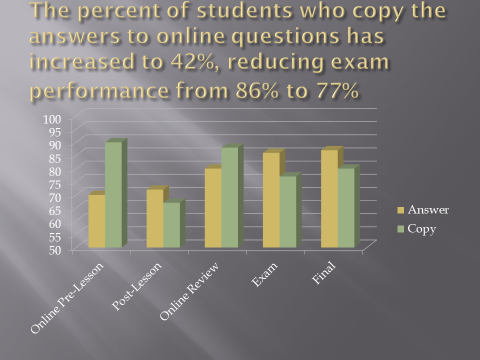Arnold Glass, Rutgers University – Percent of Students Benefiting from Homework Assignments
 Homework has never been popular with most students.
Homework has never been popular with most students.
Arnold Glass, professor of psychology at Rutgers University, examines whether students benefit from it.
BA, Psychology, University of Buffalo, 1971; PhD, Psychology, Stanford University, 1975; faculty position, Rutgers University, 1975 – present. Currently, Professor of Psychology. Fulbright Scholar. Author: Cognition: A Neuroscience Approach published by Cambridge University Press.
Percent of Students Benefiting from Homework Assignments
The effect of doing homework on exam performance was assessed for 2433 students in 12 different college lecture courses over an eleven-year period. The percent of students who did not benefit from correctly answering homework questions increased from 14% in 2008 to 55% in 2017.
A distinctive pattern of performance was found for the students who did not benefit from homework. These students performed better on homework questions than on quizzes and exams given in class. Their homework scores were higher but their exam scores were lower than other students in the class. Students who did not benefit from homework did about a letter grade worse on exams.
Students who did not benefit from homework even did well on homework questions about material that had not yet been presented in class. The students reported copying the answers from another source, often after a google search. The student self-reports were consistent with a half-century of research showing that a student must generate their own answer to create a long-term memory of the answer and with recent research showing that people do not remember information that they find using google and other smart phone applications.
The long-term effect of googling is entirely insidious. Students have no idea that in achieving higher homework scores they are sacrificing equally good scores on exams.



